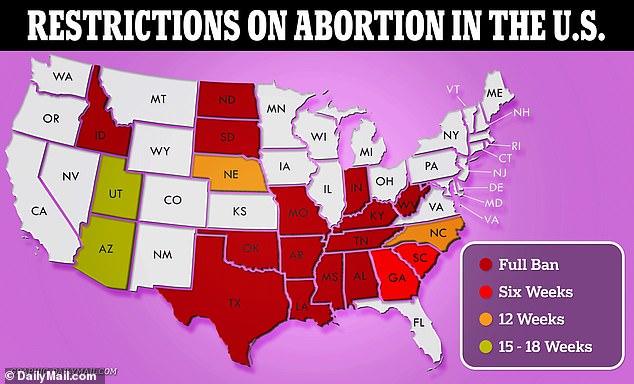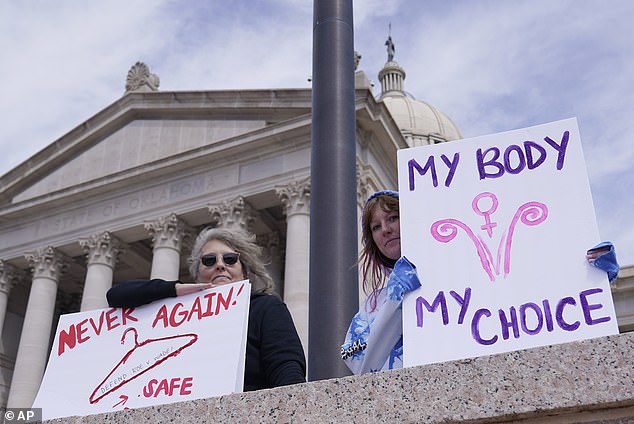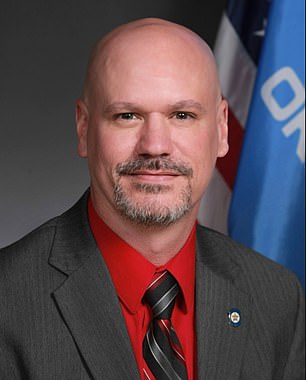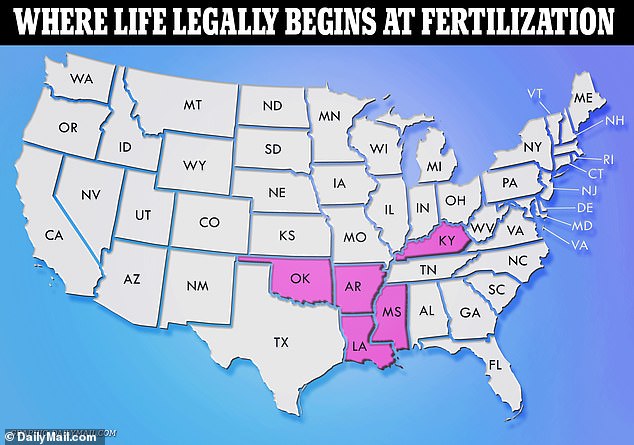Oklahoma could soon create a database that stores the details of every woman who has an abortion in the state.
Under the plans, women would be assigned a “unique identification number” that records the date, gestational age and reason for the abortion.
It would then be used to track how many subsequent abortions the woman has, in a state where all abortions are illegal except when necessary to save the mother’s life.
Supporters of the bill say it will help them track abortions in the state in the same way as births and deaths, but activists have called it an “important privacy issue.”

The map above shows abortion bans by state, including Oklahoma, where the procedure is prohibited in fertilization except in medical emergencies.


Activists are shown above outside the Oklahoma state legislature. State legislators urged not to ban abortions
The data would be stored by the state Department of Health, and there are fears that officials will be forced to release the information, including a woman’s name, by court order.
Oklahoma lawmakers proposed the ban in House Bill HB3216, also known by supporters as the state’s “Right to Life Act,” earlier this month.


The bill to create the database was introduced by Rep. Kevin West (pictured).
If approved, doctors will be required to submit details of any abortions they have performed (including patients’ names) to the state Department of Health.
The state would be required to keep these names confidential and assign each woman a “unique patient identifier” (such as a string of numbers) for use in public reporting of the data.
There are already very few abortions performed by doctors in Oklahoma, which the Governor has promised to make the most anti-abortion state in the United States.
Doctors will also be required to submit sworn statements about why the abortion was deemed necessary to “preserve the life of the pregnant woman.”
Doctors who refuse to comply with the law could have their licenses revoked or be sued by the state.
While the data could be used to verify the number of women who undergo more than one abortion, it will not record the geographic location of the procedure.


Prominent states have written laws that stipulate that life begins at the moment of fertilization. In Louisiana, the intentional removal or destruction of a human embryo is illegal
Cases in which unintentional injury or death of a fetus occurs during medical treatment would not need to be submitted to the database.
The bill has already survived two readings in the Oklahoma House of Representatives and this week passed the House Public Health Committee by a 5-1 vote.
It will face another vote in the House next month before going through two readings, a committee and a vote in the Senate. It must be signed by the Governor before it becomes law.
Representatives for Kevin West, who introduced the bill, say it’s unclear when it could become law as it could face hurdles in the legislature.
The Republican Party has a “supermajority” in the House (80 of the 101 available seats) and the Senate (40 of the 48 available seats).
The bill’s language has already been tweaked to help prevent it from banning birth control devices (IUDs) that can help prevent pregnancy.
If passed, the bill would go into effect about 30 days later.
Rep. West has revealed that he drafted the bill with thee Alliance Defending Freedom, which claims to be a Christian law firm and participated in the overturning of Roe v Wade.
Speaking at a hearing on the bill, he said he wanted to track abortions similar to how the state already tracks births and deaths.
However, many activists have criticized the bill, calling it a violation of privacy and “alarming.”
Democratic House Minority Leader Cyndi Munson, who told the daily beast: ‘It’s just a way to continue creating fear and shame.
‘[That is] not only for those seeking abortions, but also for any doctor who provides reproductive health care.’
Democratic state Rep. Trish Ranson, who sat on the health committee, criticized the bill as a “major privacy issue.”
“There is a relationship between the patient and the doctor that is sacred,” he said.
“And the fact that that is…reported elsewhere, that there is a number assigned to the woman is…just alarming.”
It comes as a second bill moves through the House that seeks to bring felony drug trafficking charges against people who possess or administer abortion-inducing medications, such as mifepristone.
Under the bill, anyone found delivering abortion pills or possessing them with the intent to perform them could face 10 years in prison or a $100,000 fine.
Mifepristone is one of two abortion bills that online pharmacies deliver to women in the state to help them end pregnancies.
It is also the subject of legal action by the Hippocratic Medicine Alliance (a collective of anti-abortion organizations) who say it should be pulled from shelves because it is “unsafe” and the approval process was flawed.
However, the Food and Drug Administration (FDA) refutes the claims, arguing that the drug is safe and effective.
He has cited a number of studies showing that serious complications are rare.
Activists have also noted that the pill has been available since 2000 and has been taken by millions of women across the country with no serious adverse reactions reported in the vast majority of cases.
